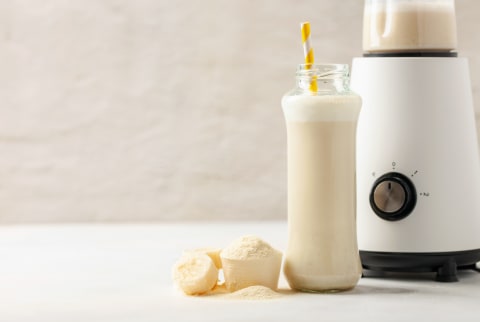Advertisement
Uh, Is Colostrum The New Collagen? Experts Weigh In


Ah, collagen: the abundant family of proteins we know and love for firm, supple, Jello-like skin. It's arguably the most popular beauty supplement out there, with a slew of options available to stir into your morning coffee or smoothie blend (some that aren't so science-backed, so keep an eye on the most common red flags).
But watch out, collagen—some folks claim colostrum is coming for your crown. How do the two powders measure up, and is colostrum really "the new" collagen? Like most skin health queries, the answer isn't so simple. Take a peek below.
What is collagen?
We have a full guide to collagen's benefits here, but at a basic level, collagen is a family of proteins1 that make up the structure of our skin, bone, cartilage, and muscle, with the purpose of helping tissues be more elastic and withstand stretching. In the context of skin, it keeps the complexion looking firm and supple.
But, sigh, your natural collagen production declines as you get older, leading to signs of skin aging, like sagging and fine lines. Consuming hydrolyzed collagen peptides, however, has been shown to help promote the body's natural production of collagen2 and other molecules that make up the skin, like elastin and fibrillin. As a result, these collagen peptides are able to support skin elasticity and dermal collagen density3.
With regular use, collagen supplements—like the quality formulas on this list—can even support your skin's hydration levels: One double-blind, randomized, placebo-controlled clinical trial found that participants' moisture levels in the skin were seven times higher4 than those who did not take collagen supplements.
Taking collagen has other beauty-related benefits, like stronger hair and nails, as well as full-body perks, like gut health, bone health, and muscle growth. (We're going to stick to skin benefits here, but feel free to take a look at the research if you're curious.)
What is colostrum?
"Colostrum is the initial milk produced by the mammary glands of mammals when they give birth," explains board-certified dermatologist Hadley King, M.D. "It's rich in nutrients, antibodies, antioxidants that help to nourish the baby and help build the baby's immune system. It changes to regular breast milk after two to three days." So it's not regular breast milk—it's supercharged breast milk.
The colostrum powders you see lining the supplement aisle typically come from cows (aka, bovine colostrum), and they're brimming with vitamins, minerals, digestive enzymes, antibodies and other immune system proteins, growth hormones, fats, and carbohydrates, King shares. When you ingest those nutrients, they can theoretically help support your immune system and gut health.
"Researchers have found that bovine colostrum supports immune function5 and intestinal health6 and can help prevent upper respiratory illnesses," adds celebrity chef, nutritionist, and reiki master Serena Poon, C.N., CHC, CHN. "Colostrum is also great for your skin6!"
Let's dive into those skin-related benefits, shall we? First things first: Colostrum and collagen are not frenemies—they actually work synergistically. "Colostrum helps stimulate collagen production7," notes Poon.
As we discussed up top, "Collagen is a protein that your body creates naturally that gives your skin elasticity," she adds. "Natural production of this protein decreases with age, so people are often looking for ways to support this process."
And thanks to those growth factors and immunoproteins, colostrum may help with fibroblast activation, wound healing, and tissue repair, says King—all of which happen to be top-notch benefits for healthy skin aging. "[Colostrum] has even been shown to repair damaged skin8," says Poon.
Who should take colostrum vs. collagen?
Not to answer a question with a question, but why choose one at all? You can totally take colostrum and collagen in the same routine. Remember: Colostrum supports collagen; no catty relationship at play here.
"Both collagen and colostrum have similar benefits in terms of skin care and for gut health," explains Poon. "Collagen supplements on their own have been shown to improve skin hydration and elasticity9 and colostrum actually helps stimulate the production of collagen7 in your body."
That being said, if you're looking for immune-supporting properties in addition to skin-related perks, you might want to turn to colostrum. On the flip side, those looking for joint comfort and muscle health may want to stick to collagen.
For what it's worth, neither supplement is vegan. But bovine colostrum is technically a dairy product (whereas bovine collagen typically comes from the connective tissue, bones, cartilage, and hides of cows), so it is not considered vegetarian. "If you prefer a vegetarian diet, then colostrum may be more appealing," says King.
If you do follow a vegan lifestyle, Poon recommends opting for other nutrients and bioactives to help you produce or maintain your natural collagen levels—like, say, vitamin C. "Colostrum helps boost collagen production, but so does vitamin C," she notes. "This antioxidant (which is not derived from animals) can be applied directly to skin or consumed to support skin elasticity and anti-aging effects10." Feel free to check out our favorite vitamin C supplements here if you're in the market for a new bottle.
The verdict
So, is colostrum the new collagen? Not quite. In fact, I hesitate to even pit the two against each other—collagen and colostrum can both be wonderful additions to your supplement routine, especially for those looking for extra skin and gut health benefits. If you want more of an immune boost, colostrum might be your best bet; if joints, bones, and protein intake are more important to you, then collagen powders might be the move.
Choose your own adventure—just don't forget to assess the labels of the product you do select.
10 Sources
- https://pubmed.ncbi.nlm.nih.gov/21421911/
- https://www.ncbi.nlm.nih.gov/pmc/articles/PMC3583892/
- https://jddonline.com/articles/dermatology/S1545961619P0009X
- https://www.ncbi.nlm.nih.gov/pmc/articles/PMC6073484/
- https://www.ncbi.nlm.nih.gov/pmc/articles/PMC8308243/
- https://www.ncbi.nlm.nih.gov/pmc/articles/PMC8228205/
- https://pubmed.ncbi.nlm.nih.gov/33938706/
- https://www.mdpi.com/1999-4923/14/2/307
- https://pubmed.ncbi.nlm.nih.gov/30681787/
- https://www.ncbi.nlm.nih.gov/pmc/articles/PMC6204628/